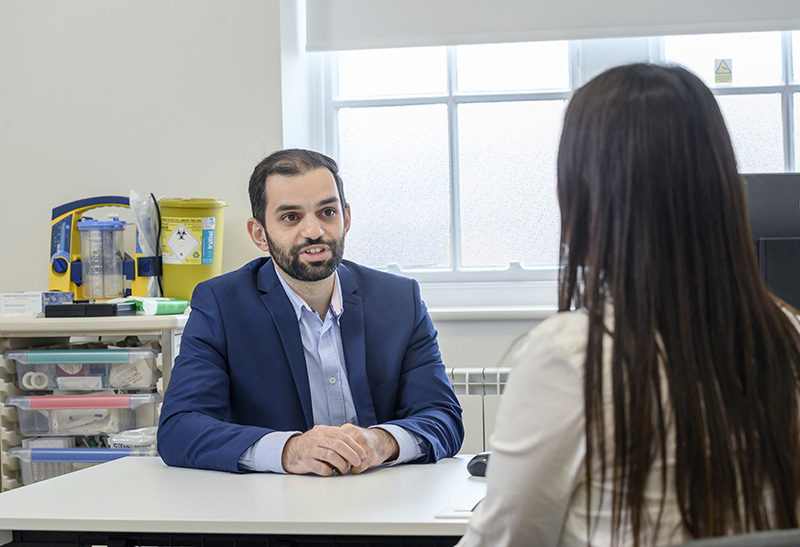Contents
Rotator Cuff Tear

A rotator cuff tear is a common shoulder injury that affects the group of muscles and tendons stabilising the shoulder joint. Tears can occur from acute trauma or develop gradually due to wear and degeneration. This condition may cause pain, weakness, and restricted movement, often impacting daily activities.
At The New Foscote Hospital in Banbury, we offer rapid access to diagnostic imaging, orthopaedic consultation, and both non-surgical and surgical treatment options for rotator cuff injuries.
What is a Rotator Cuff Tear?
The rotator cuff is a group of four muscles and their tendons that stabilise the shoulder and allow for a wide range of motion. It plays a vital role in lifting and rotating the arm.
Damage to these tendons can range from minor fraying to full-thickness tears where the tendon is completely detached from the bone.
Symptoms of a Rotator Cuff Tear
Rotator cuff tears may present suddenly after an injury or develop slowly over time. Common symptoms include:
- Pain in the shoulder, especially during overhead activity
- Pain that worsens at night or when lying on the affected side
- Weakness or reduced strength in the arm
- Difficulty lifting or rotating the arm
- A crackling or clicking sensation when moving the shoulder
- Limited range of motion
In chronic cases, symptoms may gradually worsen without obvious trauma.
Causes and Risk Factors
Rotator cuff tears may be classified as:
Acute tears – caused by trauma such as a fall or lifting a heavy object.
Degenerative tears – due to repetitive shoulder use, often in older adults or those in active occupations.
Risk factors include:
- Age over 40
- Repetitive overhead movements (e.g. painting, sports)
- Previous shoulder injuries
- Poor posture or muscle imbalance
- Smoking or poor vascular supply to the tendon
Diagnosis at The New Foscote Hospital
Diagnosis begins with a clinical examination by one of our consultant orthopaedic surgeons. We offer:
- Physical assessment of shoulder strength and range of motion
- Diagnostic imaging including X-ray to exclude bone injury
- MRI or ultrasound scanning to confirm the presence and extent of the tear
Our imaging services are available on-site, with prompt access and results.
Treatment Options
Treatment depends on the size of the tear, symptom severity, and the patient’s activity level.
Non-surgical options include:
- Physiotherapy to strengthen surrounding muscles and restore movement
- Anti-inflammatory medications or corticosteroid injections to reduce pain
- Activity modification and rehabilitation programmes
Surgical treatment may be recommended for larger or persistent tears:
- Arthroscopic rotator cuff repair – minimally invasive tendon reattachment
- Open repair surgery for complex or retracted tears
- Tendon transfer or shoulder replacement in severe, chronic cases
Our orthopaedic surgeons provide personalised surgical planning and post-operative rehabilitation.
Expert Care in Banbury
At The New Foscote Hospital, you benefit from:
- Consultant-led care by specialists in shoulder and upper limb surgery
- On-site MRI and ultrasound diagnostics
- Dedicated physiotherapy and follow-up care
- Private en-suite rooms and convenient appointments

Book an Appointment
19 June 2025
